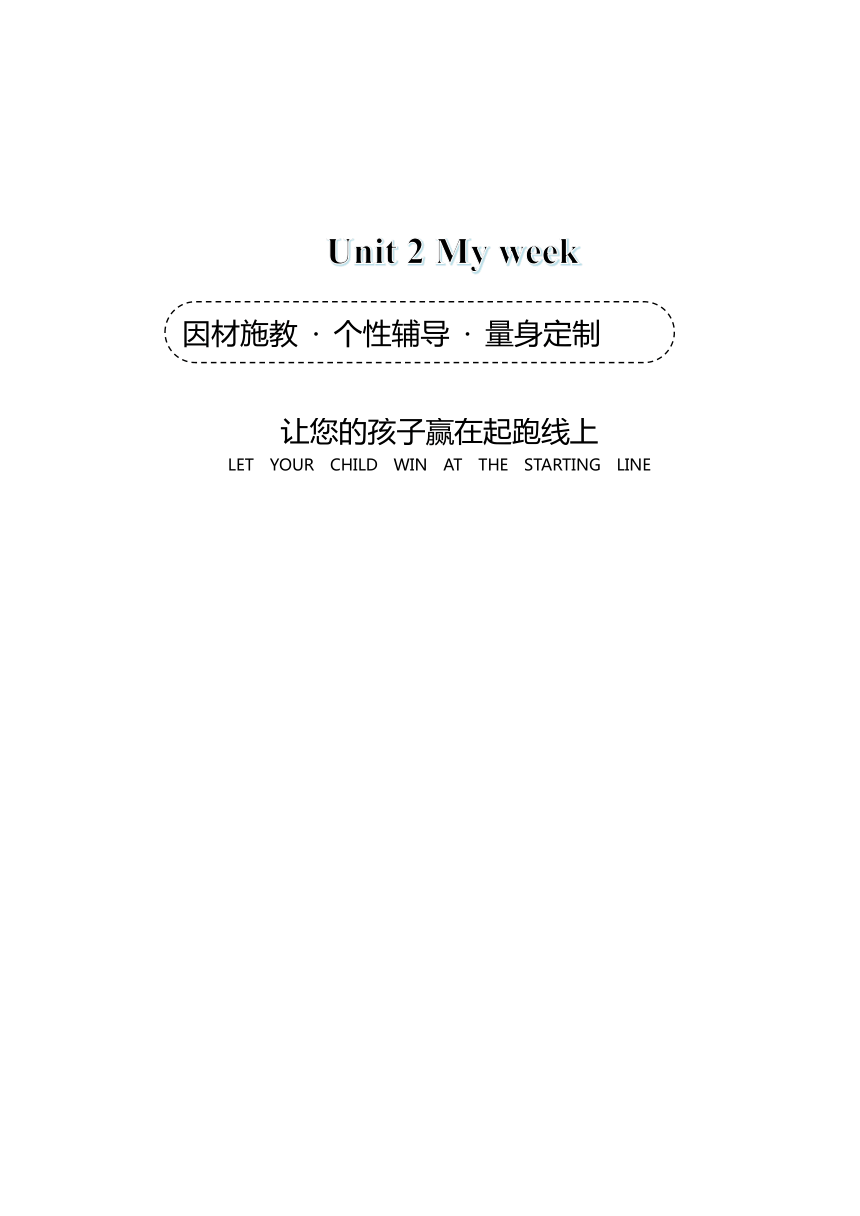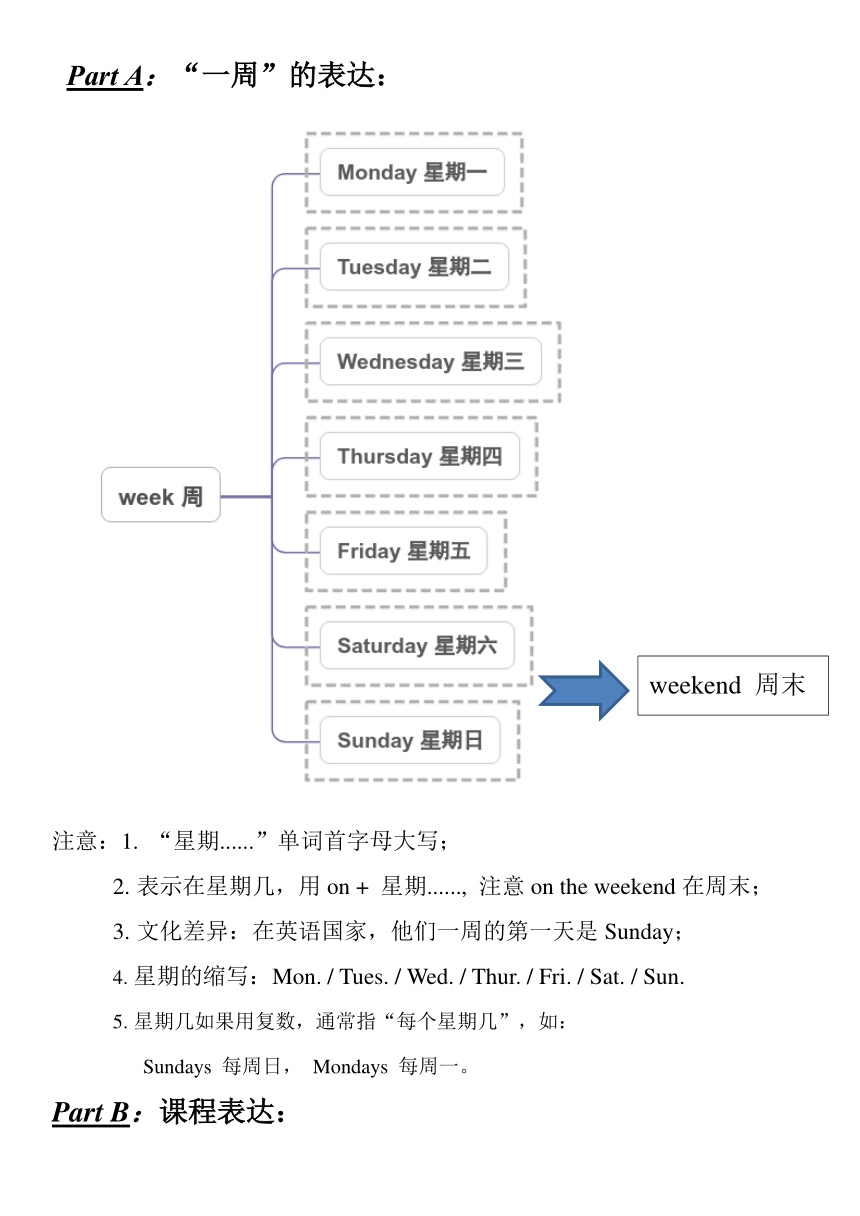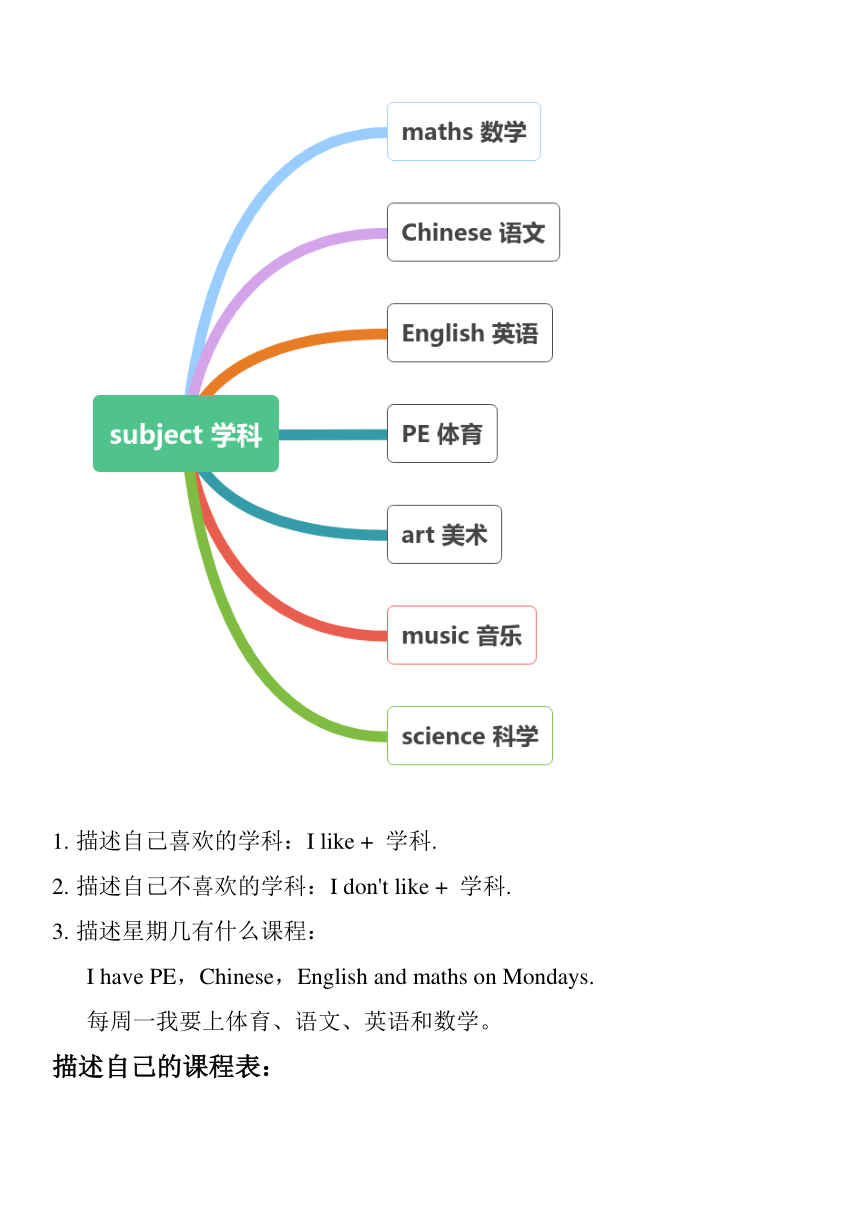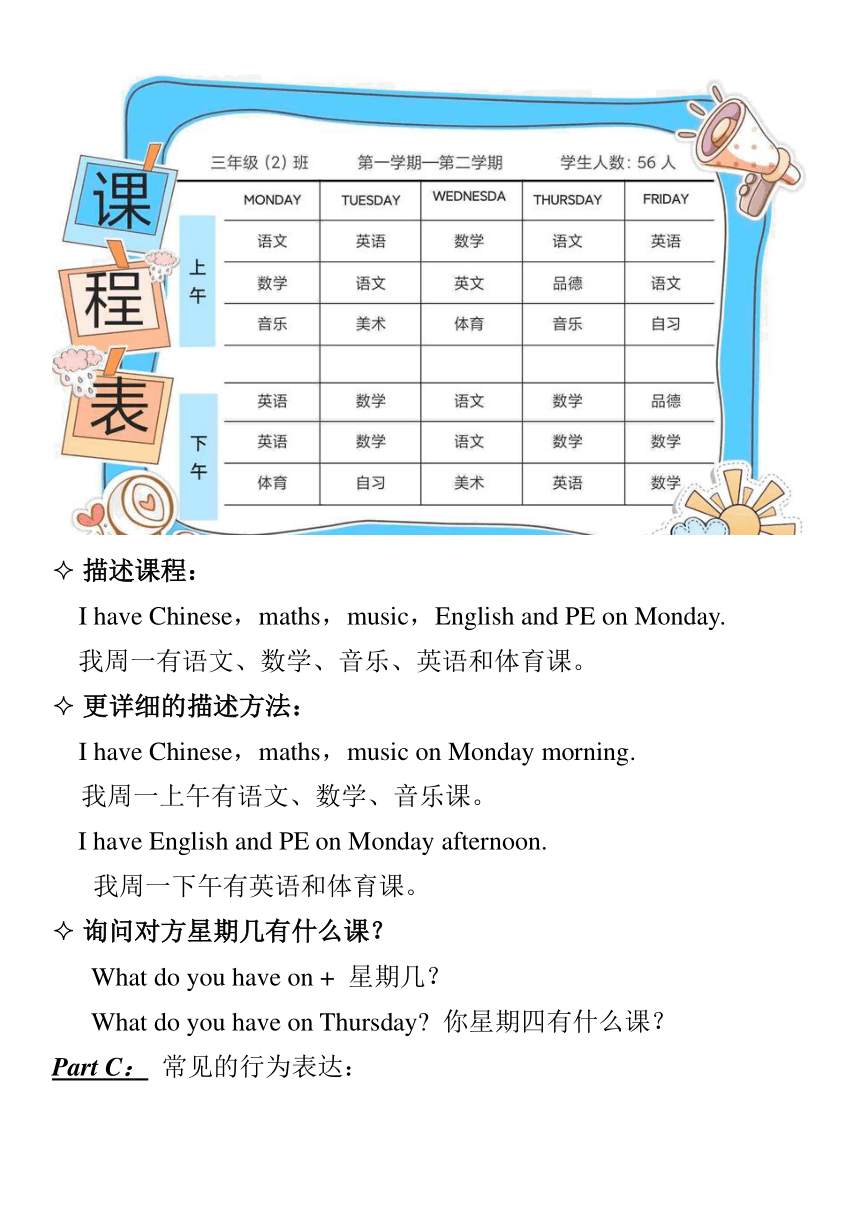Unit 2 My week 知识清单
文档属性
| 名称 | Unit 2 My week 知识清单 |  | |
| 格式 | docx | ||
| 文件大小 | 1.8MB | ||
| 资源类型 | 教案 | ||
| 版本资源 | 人教版(PEP) | ||
| 科目 | 英语 | ||
| 更新时间 | 2024-09-22 18:52:07 | ||
图片预览





文档简介
Part A:“一周”的表达:
注意:1. “星期......”单词首字母大写;
表示在星期几,用on + 星期......, 注意on the weekend在周末;
文化差异:在英语国家,他们一周的第一天是Sunday;
星期的缩写:Mon. / Tues. / Wed. / Thur. / Fri. / Sat. / Sun.
星期几如果用复数,通常指“每个星期几”,如:
Sundays 每周日, Mondays 每周一。
Part B:课程表达:
描述自己喜欢的学科:I like + 学科.
描述自己不喜欢的学科:I don't like + 学科.
描述星期几有什么课程:
I have PE,Chinese,English and maths on Mondays.
每周一我要上体育、语文、英语和数学。
描述自己的课程表:
描述课程:
I have Chinese,maths,music,English and PE on Monday.
我周一有语文、数学、音乐、英语和体育课。
更详细的描述方法:
I have Chinese,maths,music on Monday morning.
我周一上午有语文、数学、音乐课。
I have English and PE on Monday afternoon.
我周一下午有英语和体育课。
询问对方星期几有什么课?
What do you have on + 星期几?
What do you have on Thursday 你星期四有什么课?
Part C: 常见的行为表达:
watch TV wash clothes do homework
看电视 洗衣服 做家庭作业
read books play football play basketball
看书 踢足球 打篮球
play ping-pong play sports
打乒乓球 做运动
描述自己在星期几做什么:
I play football and watch TV on Monday. 我在周一踢足球和看电视。
询问对方星期几做什么事情?
What do you do on Sundays 你在每周日要做什么?
Part D:
John:Grandpa!爷爷!
Look at my picture. 看我的图片。
G:Great!太棒了!
What do you have on Thursdays 你每周四有什么课?
John:I have maths,English and music. 我有数学、英语和音乐课。
G:Oh, I love music. 哦,我爱音乐。
Who’s your music teacher 你的音乐老师是谁?
John:Mr Young. 杨老师。
G:Is he strict 他严格吗?
John:No. He's funny. 不,他很有趣。
What do you do on Thursdays, Grandpa 爷爷,你每周四要做什么?
G:Oh, I have a cooking class with your grandma. 我和你奶奶有一节烹饪课。
John:Haha!哈哈!
Part E:
Zhang Peng: Hi, Sarah. 你好,Sarah。
Sarah:It's a storybook. 它是故事书。
Zhang Peng: Do you often read books in this park?
你经常在这个公园看书吗?
Sarah:No, I don’t. 不,不是。
Do you often play football here
你经常在这里踢足球吗?
Zhang Peng: Yes, I do. 是的。
I like this park very much. 我非常喜欢这个公园。
Sarah:Me too. 我也是。
Part F:Phonics:
ee组合和ea组合发音为:/i:/
feet 脚 beef 牛肉 meet 遇见
tea 茶 read 阅读 eat 吃
绝大部分 ee 组合发长音/i:/,只有少部分发短音/i /,
如:coffee 咖啡
ea组合除了发/i:/,还可发/e/
如:bread 面包,
或者发/ei /
如: great 极好的
知识点01:on,at,in 的用法:
on+具体某一天(日期、星期几)
如: on Monday/April 6 在星期一 / 4月6日
at+具体时刻(....点钟、几点几分)
如: at 12o'clock在12点钟,at six twenty 在6点20分
in+大致时间(年、月、上午、下午、晚上)
如: in 2014 在 2014年
in the morning/afternoon /evening 在上午/下午/晚上
【牛刀小试】
一、单选题
( ) 1.I often watch TV ______ the weekend.
A.in B.at C.on
( ) 2.I have a cooking class ______ Saturdays.
A.on B.in C.under
( ) 3.The train leaves ______ 11:15.
A.on B.in C.at D.to
( ) 4.—Do you often have a PE class _______ Mondays
—Yes. I have the class _______ 4 o’clock.
in; on B.on; at C.in; at
重点句型:
“What do/does+主语+have on+星期类单词的复数形式 ” 常用来询问某天的课程安排,
答语:通常为“主语(人称代词)+have/has+表示课程的名词.”。
( ) 1.—______ on Mondays
—We have English, Chinese and music.
A.What can you do B.What do you have
C.What do you do D.What did you do
( ) 2.What do you have _____ Thursdays
A.at B.in C.on D.of
( ) 3.询问对方周二有什么课程安排时,应该说:
What do you do on Tuesdays
B.What do you have on Tuesdays
“Do/Does+主语+often+动词原形(短语) (+其他) ”用来询问某人是否经常做某事。
否定回答:“No,主语+do / does. 经常做某事;
肯定回答:“Yes,主语+don't / doesn't.”
( ) 1.—Do you often play basketball
—_________
A.Yes, I do. B.No, they don’t. C.I can dance.
( ) 2._____ you often read books _____ the weekend
Do; on B.Do; in C.Are; on
“What do/does+主语+do on+星期类单词的复数形式 ” 用于询问某天的活动安排。
What do you do on Mondays 你每周一要做什么?
I often play football,watch TV and read books.
我经常踢足球、看电视以及阅读。
-Is it Monday 是星期一吗 -No.不是
这句话问句是以be动词开头的一般疑问句,用来询问是不是星期几;
句型结构: Is it+表示星期的名词
肯定回答: Yes, it is.
否定回答: No, it isn't.
例:-Is it Friday 是星期五吗 -Yes.是的。
-Is it Tuesday 是星期二吗 -No, it isn't. 不,不是。
( ) 1. We go to school from _____to_____.
A.Monday; Friday B. Monday;Sunday C. Saturday; Sunday
( ) 2. Students have no classes on the_____.
A. week B.day C. weekend
( ) 3. -______today -No, it isn't.
It is Friday B. Is it Friday C.What day
You should play sports every day.你应该每天做体育运动
should 是情态动词意思是"应该,应当",should 后面接动词原形。
它的否定形式为should not 或shouldn't。
every day 是一个时间副词,不连写。
肯定句句型结构:主语+should+动词原形十其他
否定句句型结构:主语+should not/shouldn't+动词原形+其他
例:She should do homework on the weekend. 她应该在周末做作业。
You should finish the work today. 你应该今天完成工作。
You should not/shouldn't be late for school. 你不应该上学迟到。
【强化训练】
( ) 1.You should_____ sports every day.
A. play B.plays C.to play
( ) 2.You should do homework_____ .
A. Fridays B.every day C.everyday
( ) 3. You _____ finish your homework first.
should B.can
书面表达
请以My weekend为题。介绍你的周末。(提示词:play football, wash clothes, do homework)。不少于5句话。
范文:
My weekend
I am very busy on the weekend. On Saturday morning, I often do my homework at home. I sometimes play football with my friends in the afternoon. On Sunday morning, I often help my mum wash clothes. I usually visit my grandparents with my parents in the afternoon. What a busy weekend!
注意:1. “星期......”单词首字母大写;
表示在星期几,用on + 星期......, 注意on the weekend在周末;
文化差异:在英语国家,他们一周的第一天是Sunday;
星期的缩写:Mon. / Tues. / Wed. / Thur. / Fri. / Sat. / Sun.
星期几如果用复数,通常指“每个星期几”,如:
Sundays 每周日, Mondays 每周一。
Part B:课程表达:
描述自己喜欢的学科:I like + 学科.
描述自己不喜欢的学科:I don't like + 学科.
描述星期几有什么课程:
I have PE,Chinese,English and maths on Mondays.
每周一我要上体育、语文、英语和数学。
描述自己的课程表:
描述课程:
I have Chinese,maths,music,English and PE on Monday.
我周一有语文、数学、音乐、英语和体育课。
更详细的描述方法:
I have Chinese,maths,music on Monday morning.
我周一上午有语文、数学、音乐课。
I have English and PE on Monday afternoon.
我周一下午有英语和体育课。
询问对方星期几有什么课?
What do you have on + 星期几?
What do you have on Thursday 你星期四有什么课?
Part C: 常见的行为表达:
watch TV wash clothes do homework
看电视 洗衣服 做家庭作业
read books play football play basketball
看书 踢足球 打篮球
play ping-pong play sports
打乒乓球 做运动
描述自己在星期几做什么:
I play football and watch TV on Monday. 我在周一踢足球和看电视。
询问对方星期几做什么事情?
What do you do on Sundays 你在每周日要做什么?
Part D:
John:Grandpa!爷爷!
Look at my picture. 看我的图片。
G:Great!太棒了!
What do you have on Thursdays 你每周四有什么课?
John:I have maths,English and music. 我有数学、英语和音乐课。
G:Oh, I love music. 哦,我爱音乐。
Who’s your music teacher 你的音乐老师是谁?
John:Mr Young. 杨老师。
G:Is he strict 他严格吗?
John:No. He's funny. 不,他很有趣。
What do you do on Thursdays, Grandpa 爷爷,你每周四要做什么?
G:Oh, I have a cooking class with your grandma. 我和你奶奶有一节烹饪课。
John:Haha!哈哈!
Part E:
Zhang Peng: Hi, Sarah. 你好,Sarah。
Sarah:It's a storybook. 它是故事书。
Zhang Peng: Do you often read books in this park?
你经常在这个公园看书吗?
Sarah:No, I don’t. 不,不是。
Do you often play football here
你经常在这里踢足球吗?
Zhang Peng: Yes, I do. 是的。
I like this park very much. 我非常喜欢这个公园。
Sarah:Me too. 我也是。
Part F:Phonics:
ee组合和ea组合发音为:/i:/
feet 脚 beef 牛肉 meet 遇见
tea 茶 read 阅读 eat 吃
绝大部分 ee 组合发长音/i:/,只有少部分发短音/i /,
如:coffee 咖啡
ea组合除了发/i:/,还可发/e/
如:bread 面包,
或者发/ei /
如: great 极好的
知识点01:on,at,in 的用法:
on+具体某一天(日期、星期几)
如: on Monday/April 6 在星期一 / 4月6日
at+具体时刻(....点钟、几点几分)
如: at 12o'clock在12点钟,at six twenty 在6点20分
in+大致时间(年、月、上午、下午、晚上)
如: in 2014 在 2014年
in the morning/afternoon /evening 在上午/下午/晚上
【牛刀小试】
一、单选题
( ) 1.I often watch TV ______ the weekend.
A.in B.at C.on
( ) 2.I have a cooking class ______ Saturdays.
A.on B.in C.under
( ) 3.The train leaves ______ 11:15.
A.on B.in C.at D.to
( ) 4.—Do you often have a PE class _______ Mondays
—Yes. I have the class _______ 4 o’clock.
in; on B.on; at C.in; at
重点句型:
“What do/does+主语+have on+星期类单词的复数形式 ” 常用来询问某天的课程安排,
答语:通常为“主语(人称代词)+have/has+表示课程的名词.”。
( ) 1.—______ on Mondays
—We have English, Chinese and music.
A.What can you do B.What do you have
C.What do you do D.What did you do
( ) 2.What do you have _____ Thursdays
A.at B.in C.on D.of
( ) 3.询问对方周二有什么课程安排时,应该说:
What do you do on Tuesdays
B.What do you have on Tuesdays
“Do/Does+主语+often+动词原形(短语) (+其他) ”用来询问某人是否经常做某事。
否定回答:“No,主语+do / does. 经常做某事;
肯定回答:“Yes,主语+don't / doesn't.”
( ) 1.—Do you often play basketball
—_________
A.Yes, I do. B.No, they don’t. C.I can dance.
( ) 2._____ you often read books _____ the weekend
Do; on B.Do; in C.Are; on
“What do/does+主语+do on+星期类单词的复数形式 ” 用于询问某天的活动安排。
What do you do on Mondays 你每周一要做什么?
I often play football,watch TV and read books.
我经常踢足球、看电视以及阅读。
-Is it Monday 是星期一吗 -No.不是
这句话问句是以be动词开头的一般疑问句,用来询问是不是星期几;
句型结构: Is it+表示星期的名词
肯定回答: Yes, it is.
否定回答: No, it isn't.
例:-Is it Friday 是星期五吗 -Yes.是的。
-Is it Tuesday 是星期二吗 -No, it isn't. 不,不是。
( ) 1. We go to school from _____to_____.
A.Monday; Friday B. Monday;Sunday C. Saturday; Sunday
( ) 2. Students have no classes on the_____.
A. week B.day C. weekend
( ) 3. -______today -No, it isn't.
It is Friday B. Is it Friday C.What day
You should play sports every day.你应该每天做体育运动
should 是情态动词意思是"应该,应当",should 后面接动词原形。
它的否定形式为should not 或shouldn't。
every day 是一个时间副词,不连写。
肯定句句型结构:主语+should+动词原形十其他
否定句句型结构:主语+should not/shouldn't+动词原形+其他
例:She should do homework on the weekend. 她应该在周末做作业。
You should finish the work today. 你应该今天完成工作。
You should not/shouldn't be late for school. 你不应该上学迟到。
【强化训练】
( ) 1.You should_____ sports every day.
A. play B.plays C.to play
( ) 2.You should do homework_____ .
A. Fridays B.every day C.everyday
( ) 3. You _____ finish your homework first.
should B.can
书面表达
请以My weekend为题。介绍你的周末。(提示词:play football, wash clothes, do homework)。不少于5句话。
范文:
My weekend
I am very busy on the weekend. On Saturday morning, I often do my homework at home. I sometimes play football with my friends in the afternoon. On Sunday morning, I often help my mum wash clothes. I usually visit my grandparents with my parents in the afternoon. What a busy weekend!
